WashU Nephrology scientists and clinical researchers are nationally and internationally recognized for seminal breakthroughs in nephrology research that advance the understanding of the mechanisms behind renal dysfunction and the development of new patient care practices.
Our clinical and translational research activities encompass outcomes research, biomarker discovery, genomics, clinical trials, and discovery/validation studies. In addition, our Translational Innovation Grant (TIG) program awards funding annually to a basic scientist and clinician from within the division to pursue a collaborative project with translational potential. See more about the annual TIG grant program below.
Meet our investigators:
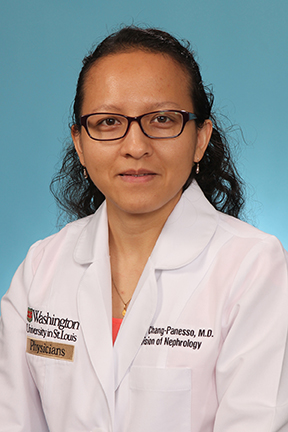
Monica Chang-Panesso, MD, Assistant Professor of Medicine, studies the molecular mechanisms underlying the repair response after acute kidney injury, with a special interest in how this differs in aging and potentially drives a higher incidence of failed repair. She is the first recipient of the Roger M. Perlmutter Career Development and was honored with an American Society for Clinical Investigation (ASCI) Council Young Physician-Scientist Award.
Recent publications:
- Acute kidney injury and aging; Pediatric Nephrology, 2021.
- Tubular MST1/2 Deletion and Renal Fibrosis; JASN, 2020.
- FOXM1 drives proximal tubule proliferation during repair from acute ischemic kidney injury; Journal of Clinical Investigation, 2019.

Feng Chen, PhD, Associate Professor of Medicine, studies kidney diseases and cancer. Dr. Chen has a 2.2M R01 grant from the NIH National Human Genome Research Institute (NHGRI) that is funding a research project titled Pathogenic Variant Discovery Across a Broad Spectrum of Human Diseases.
Recent publications:
- Moving pan-cancer studies from basic research toward the clinic; Nature Cancer, 2021.
- Comprehensive characterization of 536 patient-derived xenograft models prioritizes candidates for targeted treatment; Nature Communications, 2021.

Ying Maggie Chen, MD, PhD, Associate Professor of Medicine, studies endoplasmic reticulum stress-mediated kidney diseases. Dr. Chen recently received a $1.8M Department of Defense Grant to develop treatment for FSGS.
Recent publications:
- Ultrabright plasmonic fluor nanolabel-enabled detection of a urinary ER stress biomarker in autosomal dominant tubulointerstitial kidney disease; AJP – Renal Physiology, 2021.
- Discovery of endoplasmic reticulum calcium stabilizers to rescue ER-stressed podocytes in nephrotic syndrome; PNAS, 2019.

Leslie Gewin, MD, Associate Professor of Medicine, is interested in understanding how tubular responses to kidney injuries such as diabetes and hypertension lead to repair versus progressive destruction of kidney function and the need for renal replacement therapy. Her lab focuses on understanding how growth factors like Wnt/beta-catenin and changes in metabolism and cell cycle modulate the epithelial response to injury.
Twitter: @LeslieGewin
Recent publications:
- Sugar or Fat? Renal Tubular Metabolism Reviewed in Health and Disease; Nutrients, 2021.
- Tubular β-catenin and FoxO3 interactions protect in chronic kidney disease; JCI Insight, 2020.
- Blocking TGF- β and β-Catenin Epithelial Crosstalk Exacerbates CKD; JASN, 2017.
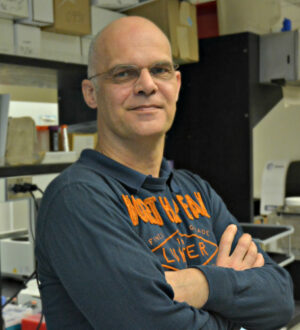
Andreas Herrlich, MD, PhD, Associate Professor of Medicine and Director of Translational Medicine, studies growth factors and kidney disease. Dr. Herrlich recently received a 1.45M R01 grant to study amphiregulin and kidney fibrosis.
Twitter: @HerrlichLab
Recent publications:
- Mechanisms of interorgan crosstalk in health and disease; FEBS Letters, 2022.
- Identification of kidney injury released circulating osteopontin as causal agent of respiratory failure; Science Advances, 2022.
- Interorgan crosstalk mechanisms in disease: the case of acute kidney injury-induced remote lung injury; FEBS Letters, 2022.

Benjamin Humphreys, MD, PhD, Joseph Friedman Professor of Renal Diseases in medicine and Chief, Division of Nephrology, studies kidney stem cell and regenerative biology. Dr. Humphreys recently received his second Chan Zuckerberg grant, which will define the transcriptome and epigenome of the normal human kidney.
Twitter: @HumphreysLab
Recent publications:
- Understanding How Genetic Background Affects Kidney Function at the Single-Cell Level; American Journal of Kidney Diseases, 2022.
- Single Cell Technologies: Beyond Microfluidics; Kidney360, 2021.
- Kidney repair and regeneration: perspectives of the NIDDK Re(Building) a Kidney consortium; Kidney International, 2022.
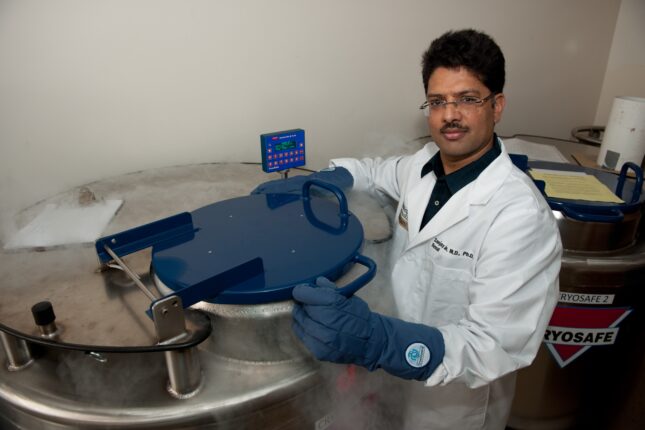
Sanjay Jain, MD, PhD, Associate Professor of Medicine and director of the Kidney Translational Research Center, studies development and diseases of the urogenital and nervous systems. Dr. Jain recently received an NIH HuBMAP grant for generation of a single cell and 3D molecular atlas of the urinary system.
Recent publications:
- Integrated single cell sequencing and histopathological analyses reveal diverse injury and repair responses in a participant with acute kidney injury: A clinical-molecular-pathologic correlation; Kidney International, 2022.
- A Pilot Study of Urine Proteomics in COVID-19-Associated Acute Kidney Injury; Kidney International Reports. 2021.

Anuja Java, MD, Assistant Professor of Medicine and the Director of Kidney Transplant at the John Cochran VA Medical Center. Dr. Java is a renowned physician-scientist and expert in rare complement diseases and their involvement in kidney damage, including atypical hemolytic uremic syndrome (aHUS).
Twitter: @anuja_java
Recent publications:
- Clinicopathologic Implications of Complement Genetic Variants in Kidney Transplantation; Frontiers in Medicine, 2021.
- Functional Analysis of Rare Genetic Variants in Complement Factor I (CFI) using a Serum-Based Assay in Advanced Age-related Macular Degeneration; Translational Vision Science and Technology, 2020.
- The complement system in COVID-19: friend and foe?; JCI Insight, 2020.

Moe Mahjoub, PhD, Assistant Professor of Medicine, studies the role of the centrosome and cilium during development, and their dysfunction in human disease. Dr. Mahjoub is part of a group who recently received a $3.14M NHLBI grant to examine regulation of motile cilia assembly in lung disease.
Twitter: @MahjoubLab
Recent publications:
- RNA-Seq identifies genes whose proteins are upregulated during syncytia development in murine C2C12 myoblasts and human BeWo trophoblasts. Physiological Reports, 2021.
- Super-Resolution Microscopy and FIB-SEM Imaging Reveal Parental Centriole-Derived, Hybrid Cilium in Mammalian Multiciliated Cells. Developmental Cell, 2020.
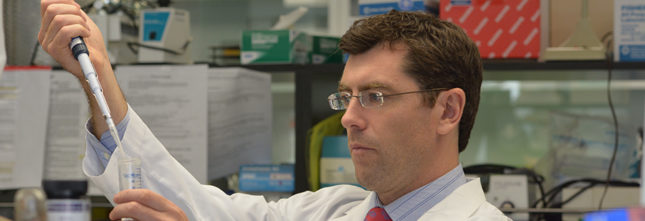
Andrew Malone, MB, BCh, Assistant Professor of Medicine, Transplant Nephrology, focuses primarily on the immune cell landscape in human kidney transplants. Their goal is to answer important clinical questions in transplantation by applying modern experimental techniques on human samples. Their team was the first to publish on the application of single cell RNA-seq to single core kidney transplant biopsy samples.
Twitter: @AndrewFMalone
Recent publications:
- Monocytes and Macrophages in Kidney Transplantation and Insights from Single Cell RNA-Seq Studies; Kidney360, 2021.
- APOL1 risk variants in kidney transplantation: a modulation of immune cell function; Journal of Clinical Investigation, 2021.
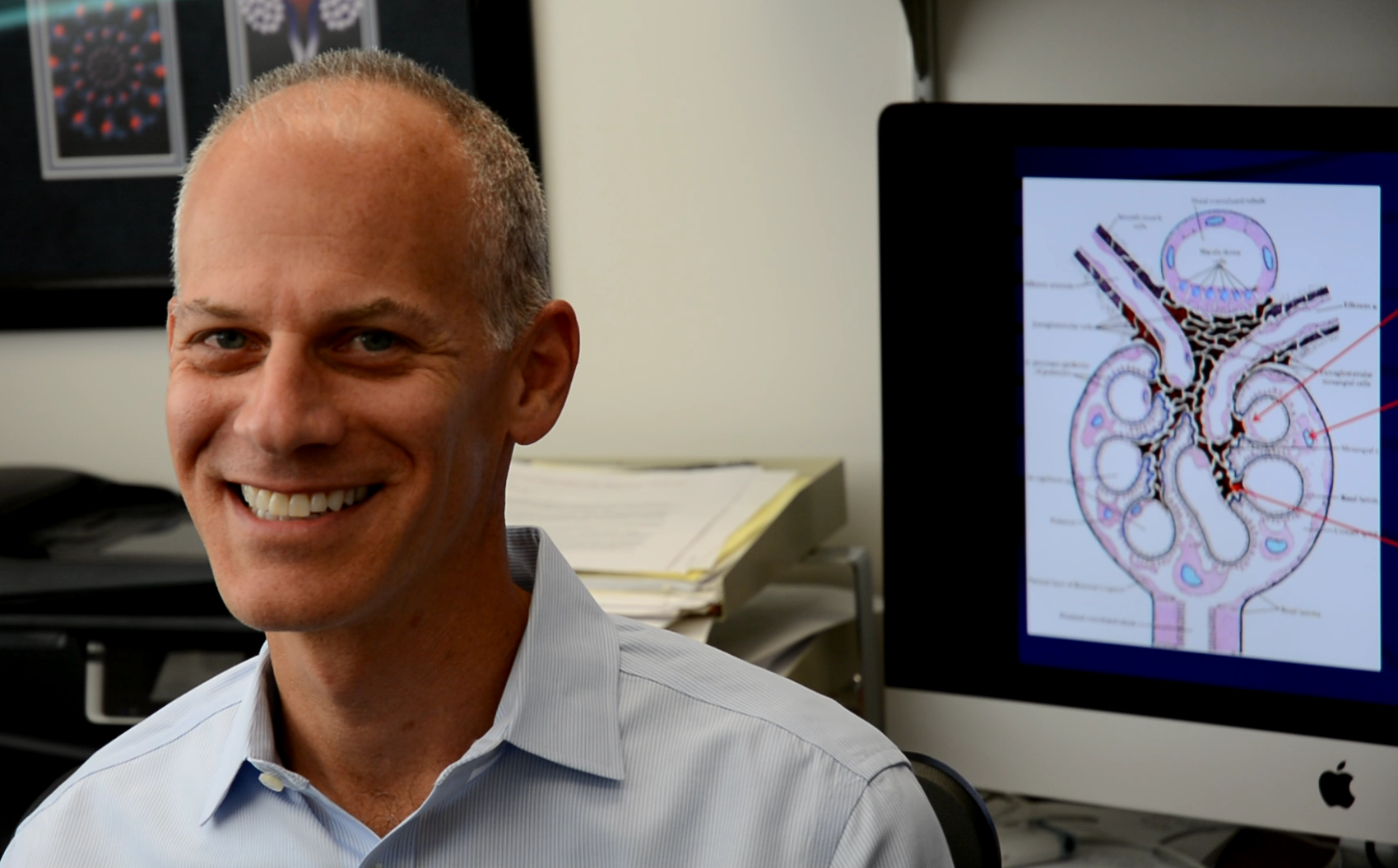
Jeffrey Miner, PhD, FASN, Eduardo and Judith Slatopolsky Endowed Professor of Medicine in Nephrology, studies the role of the glomerular basement membrane in kidney function and diseases. Dr. Miner is the principal investigator of the new CDI Pediatric Disease Mouse Models Core and is president of the American Society for Matrix Biology (ASMB) for 2021-2022.
Twitter: @JeffMinerPhD
Recent publications:
- The 2019 and 2021 International Workshops on Alport Syndrome; European Journal of Human Genetics, 2022.
- NanoLuc reporters identify COL4A5 nonsense mutations susceptible to drug-induced stop codon readthrough; iScience, 2022.
- Three-Dimensional Visualization of the Podocyte Actin Network Using Integrated Membrane Extraction, Electron Microscopy, and Machine Learning; Journal of the American Society of Nephrology, 2022.
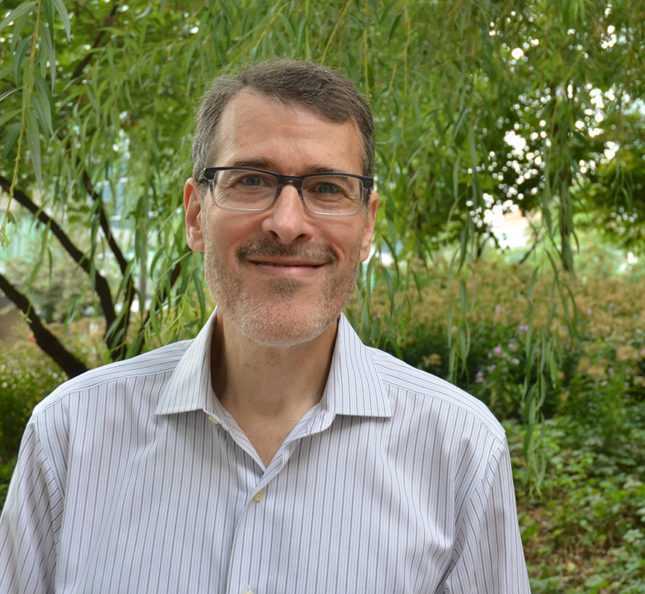
Michael Rauchman, MDCM, Professor of Medicine and Sectional Chief of Nephrology at St. Louis Veteran’s Affairs Medical Center, studies molecular and genetic basis of kidney development and how disruption of specific pathways leads to abnormal development of the kidney. Rauchman was recently installed as Chromalloy Professor of Renal Diseases in Medicine and is very active in research at the VA.
Recent publications:
- SALL1 functions as a tumor suppressor in breast cancer by regulating cancer cell senescence and metastasis through the NuRD complex; Molecular Cancer, 2022.
- The core SWI/SNF catalytic subunit Brg1 regulates nephron progenitor cell proliferation and differentiation; Developmental Biology, 2020.
- Analysis of FGF20-regulated genes in organ of Corti progenitors by translating ribosome affinity purification; Developmental Dynamics, 2020.
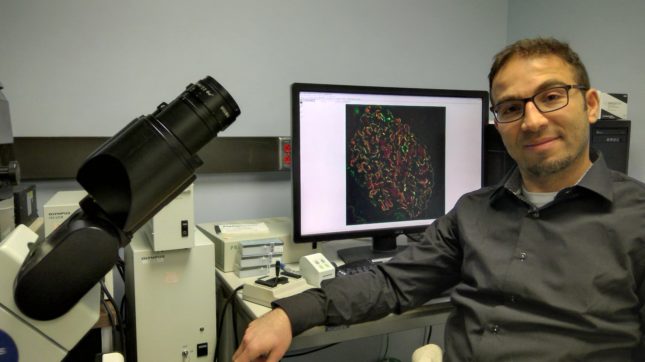
Hani Suleiman, MD, PhD, Assistant Professor of Medicine, studies podocyte biology, in particular the podocyte’s change under pathological conditions and the role of isoactins, tropomyosins and formins in governing such change. The diseases that are the focus of his laboratory are mainly kidney glomerular diseases from genetic diseases such as focal segmental glomerulosclerosis, to diseases such as diabetic nephropathy and transplant glomerulopathy.
Twitter: @hansul
Recent publications:
- 3D Visualization of the Podocyte Actin Network using Integrated Membrane Extraction, Electron Microscopy, and Machine Learning; JASN, 2022.
- Injury-induced actin cytoskeleton reorganization in podocytes revealed by super-resolution microscopy; JCI Insight, 2017.
- Nanoscale Protein Architecture of the Kidney Glomerular Basement Membrane; Elife, 2013.
WashU Nephrology’s Translational Innovation Grant (TIG)
The Division of Nephrology offers an annual grant ($50,000) to bring together a basic scientist and clinician from within the division to pursue a collaborative project with translational potential.
Recipients of the TIG grant:
- 2022 – Andreas Herrlich, MD, PhD, Charbel Khoury, MD, and Megan Moseley, Physician Assistant in Critical Care, Anesthesiology, will Study Osteopontin in COVID-19 associated acute respiratory distress syndrome (ARDS).
- 2020 – Sanjay Jain, MD, PhD, and Tingting Li, MD developed methods for single nucleus transcriptomic studies on archived diagnostic frozen kidney biopsy tissue from patients with pauci-immune glomerulonephritis (PIGN).
- 2019 – Eirini Kefalogianni, PhD, and Charbel C. Khoury, MD, worked together on a project titled Circulating immune cell types in diabetic nephropathy and their regulation by circulating TNFR1/2. Their aim was to characterize the forms and functions of circulating TNFR1/2 in diabetic nephropathy and test their effects on circulating immune cells with regard to surface receptor and cytokine expression profiles. Findings from the study could spur the development of drugs that target TNFR1/2 pathways for the prevention or treatment of diabetic nephropathy or other chronic kidney diseases.
- 2017 – Hani Suleiman, MD, PhD and Tarek Alhamad, MD, collaborated on a project called Novel Diagnostic Imaging Techniques for Transplant Glomerulopathy (TG), which used “super-resolution imaging” techniques to search for markers that could serve as identifiers for the etiology behind transplant glomerulopathy. Their imaging technique allowed a traditional light microscope to examine the glomerular basement membrane and glomerular endothelial cells without the need for electron microscopy (EM). Their goal was to find a sensitive, less expensive and more readily available method for diagnosing TG.
- 2016 – The winning proposal by Moe Mahjoub, PhD and Seth Goldberg, MD, titled Midbody Accumulation and Secretion in Polycystic Kidney Disease, examined how defects in components of the cell cytoskeleton contribute to the pathogenesis of polycystic kidney disease (PKD). The team also focused on identifying novel urinary biomarkers that could be used as a low cost, non-invasive method to monitor PKD progression and cyst burden.
- 2015 – Ying (Maggie) Chen, MD, PhD, and Andrew Malone, MD, were recipients of the inaugural Translational Innovation Grant. Their proposal, Targeting Podocyte Endoplasmic Reticulum Stress in Alport Syndrome, focused on identifying pathogenic mutations in collagen genes that lead to Alport’s syndrome.